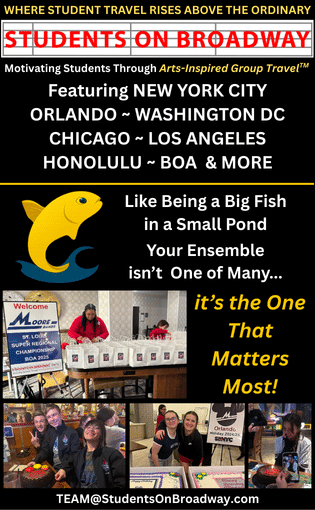During my 27-year career I have worked for 15 principals and assistant principals and 4 superintendents, and breaking in a new boss never gets any easier. Sometimes I am glad to get a new boss, particularly if the previous one did not seem to grasp the easiest of concepts, such as the world revolves around the band. Other times I had just gotten a principal trained only to see him leave soon thereafter. I had hoped that the principal I had last year would stay the rest of my career, but he up and retired without asking me. Over time he came to understand the difference between region festival, solo and ensemble, and all-region try-outs. (This is no small feat; I had a former principal who called one of my classes solo and ensembo. I never had the courage to correct him.)
When I got my new principal this year I felt like a kid with a new band director. I didn’t want a new boss. I liked the old one. For the first time in my career, the principal is younger than I am. Previously when I was in a heated argument with a principal I could say, “I was here before you came, and I’ll be here after you’re gone.” Actually, I’ve never said this to a principal but I’ve smirked while thinking it in their presence. At my age it may not even be true anymore.
It wasn’t so bad requesting things from a principal older than me, but to ask permission from someone younger takes some adjusting. There is a part of me that feels at my advanced age I should relate to this spring chicken of a principal by leaning over like a doddering Igor and pining, “Yes, Master. Anything you say, Master.” The things I ask about are things I’ve been doing for years. I feel like Bill Murray in the movie Groundhog Day, living the same day over and over again, but now it’s a year.
I wish I could pick my own boss; that would make things so much easier. I can imagine my interview would go something like this:
“What is your favorite movie?”
Acceptable answers: Mr. Holland’s Opus and The Music Man.
Wrong answers: Ernest Goes to Camp and Block Scheduling: The Documentary.
“What is your favorite book?”
Acceptable answers: John Phillip Sousa: American Phenomenon, and Teaching Music with Purpose, Passion, and Promise.
Wrong answers: Anything under 25 pages or Administration for Dummies.
“Who is your favorite composer?”
Acceptable answers: Any classical composer. Any band composer on the Texas UIL list.
Wrong answers: John Tesh, Lady Gaga, That Mossart (Mozart) Guy.
“How much money would you give the band for its budget?”
Acceptable answers: “Whatever you think is fair,” or “One dollar more than the athletic department.”
Wrong answer: “You need money? For what?”
“How many away football games must the band attend?”
Acceptable answer: “It’s up to you.”
Wrong answer: “All of them.”
If applicants make it this far, we would then go outside and see how crisply they can perform a few facing movements and a little eight-to-five. The final step is to see how deftly they can slather a hot dog with condiments at the band concession stand.
Keys to Breaking in a New Boss
Even though we are unlikely ever to choose our own boss, there are things that can be done to ease the transition. Communication is key; meet with the new principal as soon as possible and provide a copy of your resume. While you are not interviewing for a job, you are interviewing for his trust. Provide a copy of the band handbook and say that you would be glad to answer any questions about it.
In the first meeting make clear some of your basic philosophies and any issues that might cause conflict later on. It is much better to head off problems ahead of time. Last summer, shortly after my new principal arrived, I explained my feelings about away football games and how they fit into the educational goals for the program. (Basically, the less the better.) If this was something he disagreed with, I wanted to find out early. If he left the matter up to me, I wanted to give my rationale so he would have answers ready, if questioned about it.
Keep in mind that new principals feel pressure from many sides; tasks they ask of the band director are often things they are pressured to implement by parents and higher-ups. Accept that you may have to make changes to help them out. One pleasure of my new position at Riverview was not having to drag the band out to a bonfire during homecoming week where, at least in my past experience, the only ones who showed up were football players, cheerleaders, a coach or two, an obligatory principal, and a stray dog. All my band students received for their efforts were singed eyebrows from using the fire to see their music. This year the booster club asked my new principal to have a bon fire pep rally even though we were having a pep rally the next day at school. (I think the logic was that it would double our chances of winning.) I agreed to help only because he would look bad if it didn’t work out. (I didn’t express that to him, however.) I did request that he let me skip the event next year if hardly anyone showed up.
To help a new principal feel more a part of the school, invite him to a rehearsal, band parent meeting, or early performance and introduce him to students and parents. You are not the only one that wants to make a good impression. A new principal wants the support of as many parents as possible, and band parents are often the most active and influential in the school.
As the year progresses, maintain open lines of communication. Keep the principal abreast of events and traditions, provide regular updates on the progress of the band, and offer thanks and encouragement when appropriate. With time, your principal may even come to agree with you that the world revolves around band.






